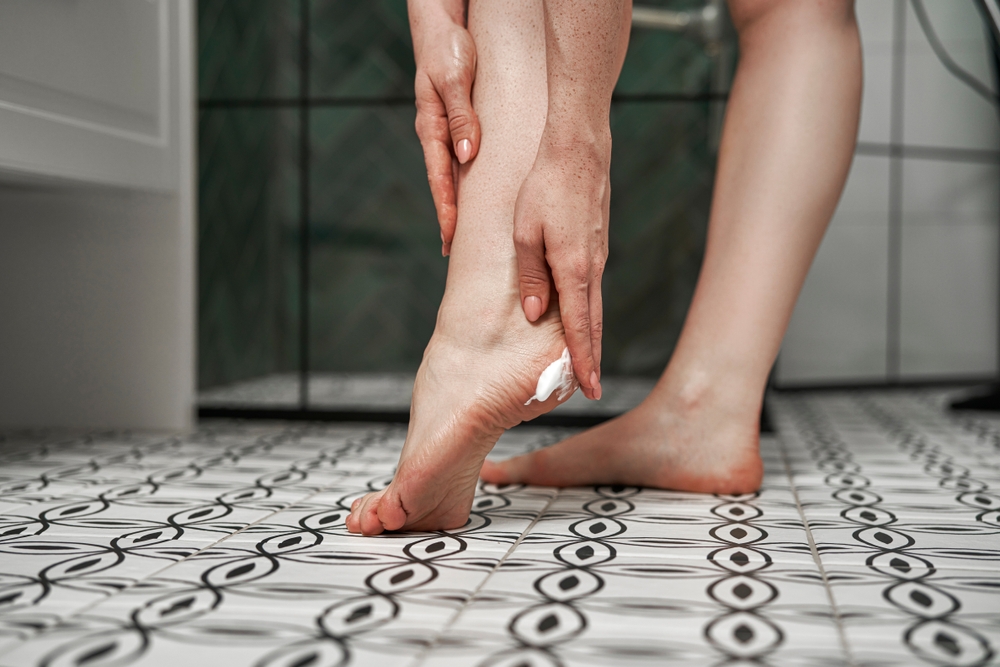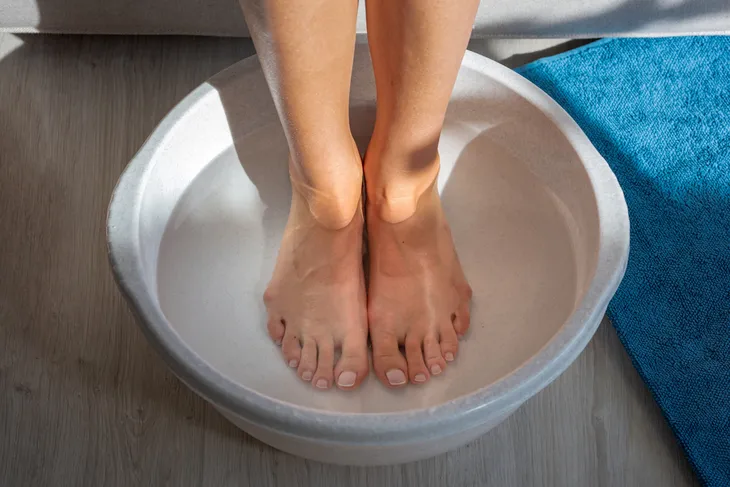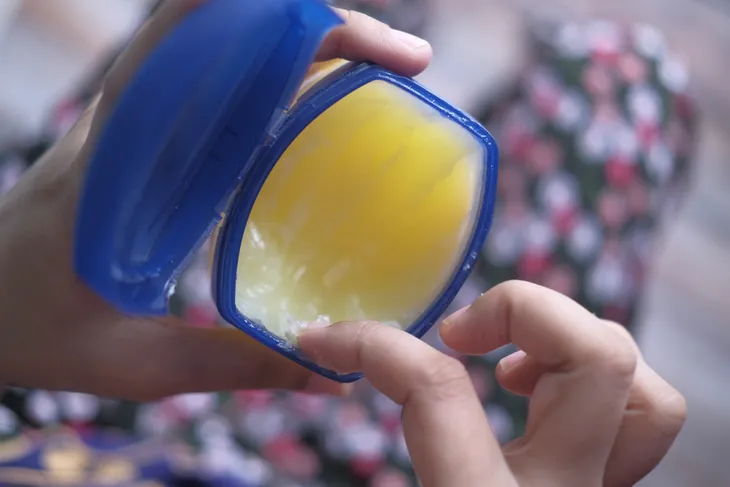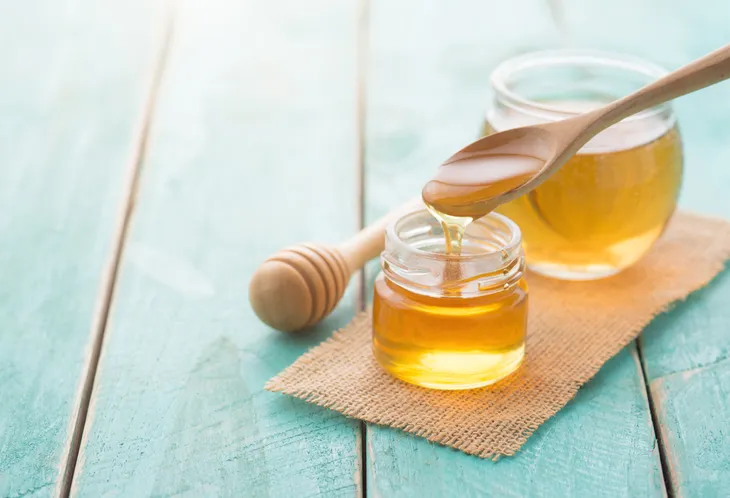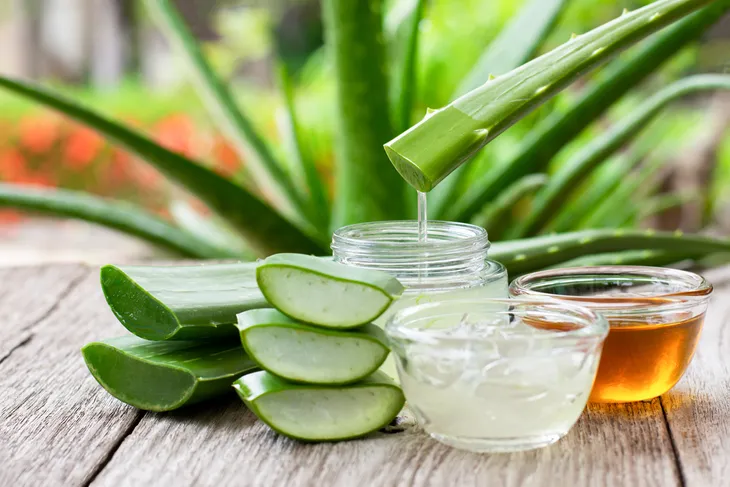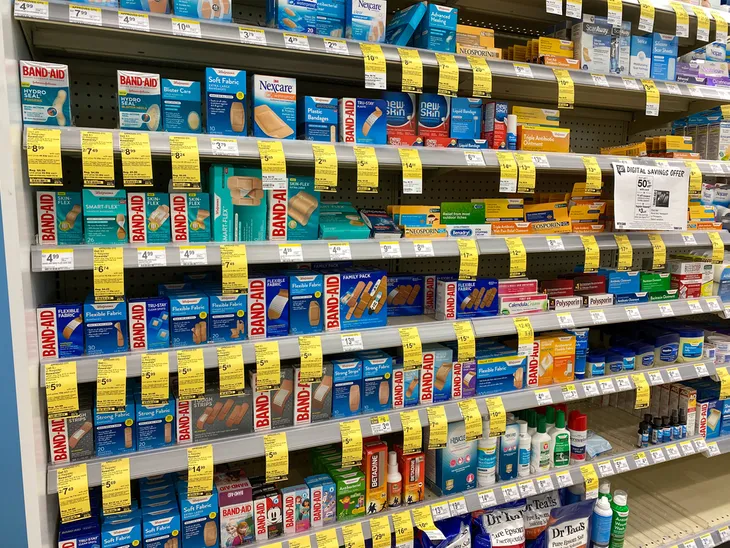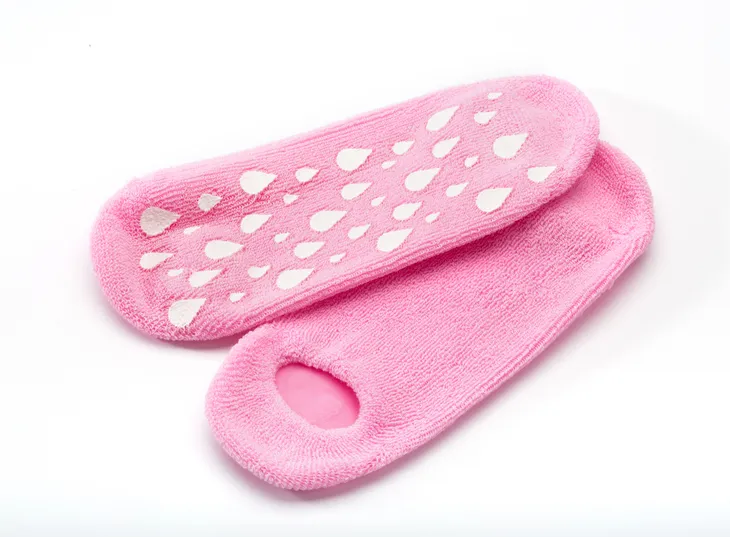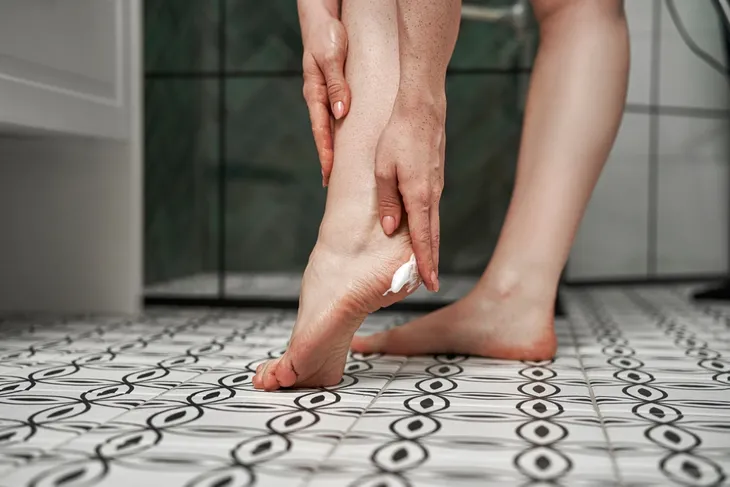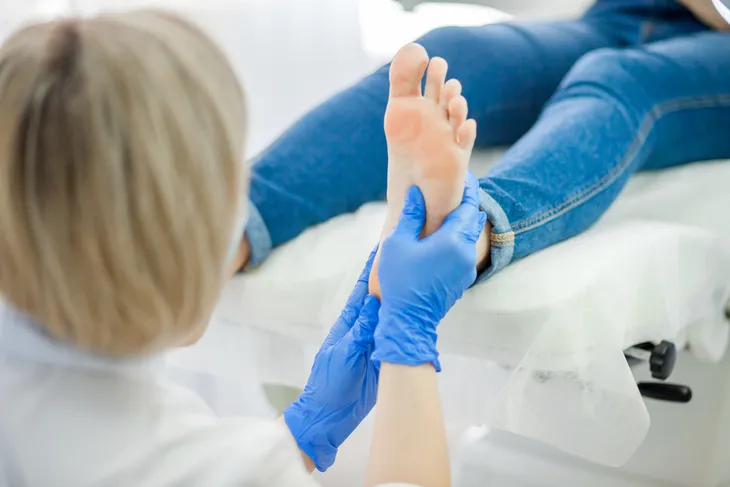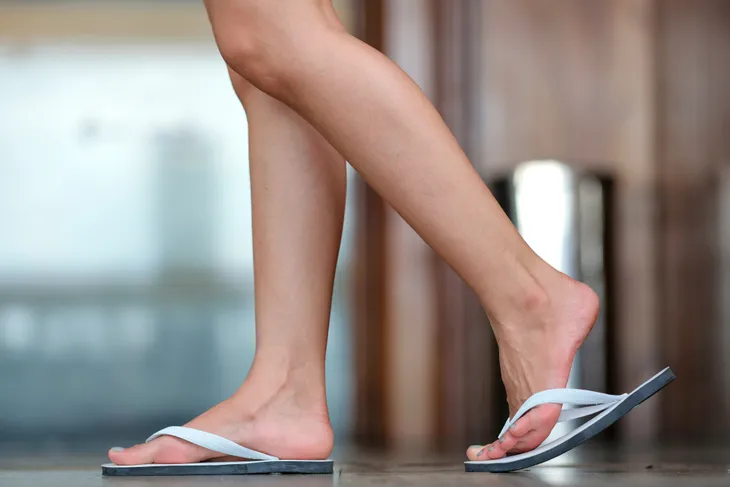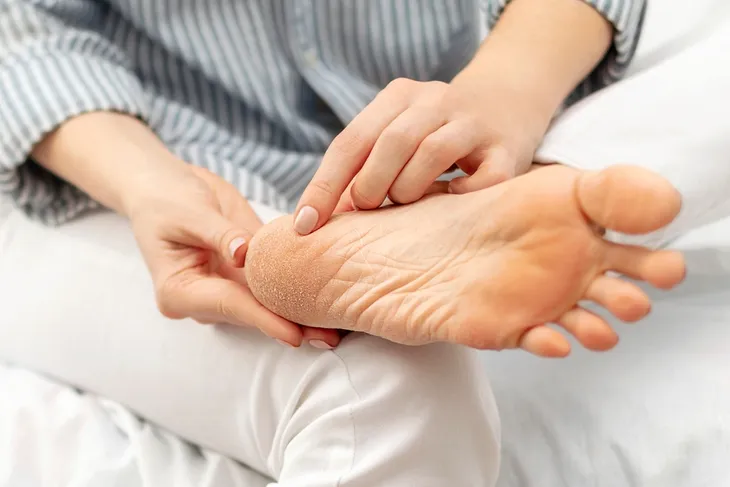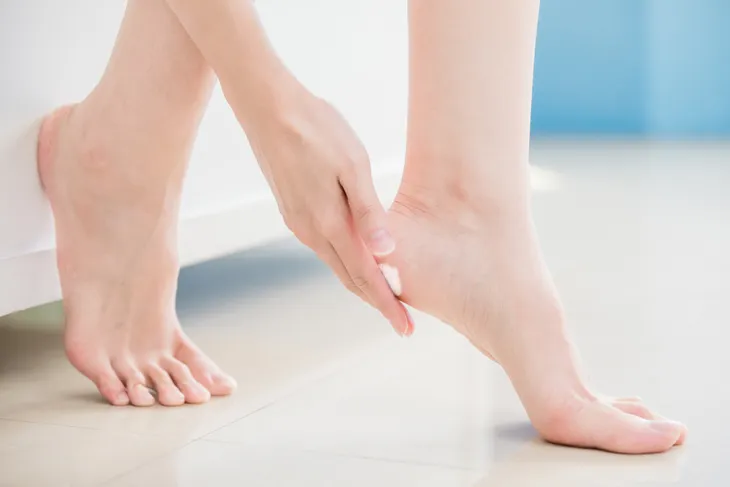- Cracked heels and feet typically aren’t a serious health concern, but they can lead to complications if left untreated.
- Fortunately, home remedies that might be sitting in your medicine and kitchen cabinets right now can help heal cracks.
- Additionally, there are several measures you can take to help protect your feet and prevent future cracked heels.
Cracked heels can be unsightly and uncomfortable nuisances. While you might feel an urge to pick or peel cracked heels, resist the impulse. Peeling off the skin can make things worse and even lead to an infection. Instead, one option is to turn to a home remedy.
Cracks and calluses are common, but you don’t have to live with them. Here are eight home remedies to help heal cracked heels — plus, what causes them and how to prevent cracked heels in the first place.
Soak, Exfoliate, Moisturize
Since cracked heels tend to be thicker and harder than the rest of your skin, it can help to soak them first. That’s because soaking can soften the skin and prepare your heels for the next step of this home remedy — exfoliation. Healthline suggests following these steps:
- Submerge your feet in lukewarm, soapy water for about 20-minutes.
- Remove hard skin with a pumice stone, foot scrubber, or loofah.
- Dry your feet thoroughly by gently patting the skin.
- Apply a thick moisturizer and a layer of petroleum jelly.
- Finally, put on socks to keep petroleum jelly from getting on the floor.
Petroleum Jelly
You can also use petroleum jelly as an overnight treatment. Everyday Health suggests using petroleum jelly overnight because it can “take a while to soak in.” Before heading to bed, coat your feet in petroleum jelly. Then slip on socks to keep the salve on your feet — not all over your sheets.
So, what makes petroleum jelly an effective home remedy for cracked heels? HowStuffWorks says it’s an occlusive moisturizer that protects the skin and locks in moisture. To put it another way, the source compares petroleum jelly to “putting plastic around the skin.”
Honey
While petroleum jelly is a medicine cabinet staple, this next home remedy might be sitting in your kitchen cabinet — honey. Dermatologist Sheel Desai Solomon, MD, tells NBC News, “Honey is full of antimicrobial and antibacterial properties great for cleansing and healing wounds, particularly Manuka honey.”
She recommends using honey as the base ingredient of a DIY foot mask. Simply add a drop of almond oil to the honey and apply the combination to your heels. Women’s Health also recommends using honey as a moisturizing skin mask that you rinse off after 20-minutes.
Aloe Vera
Aloe vera gel is another salve known for its moisturizing and restorative properties. According to The Good Stuff Botanicals, aloe vera is rich in vitamins, minerals, and enzymes. And Scientific American says it has “antiseptic, anti-inflammatory, and analgesic properties.”
As a result, aloe vera can pack a punch as a home remedy for cracked heels. Medical News Today suggests liberally applying aloe vera gel to your feet and then putting on socks. If you want to get the most out of this remedy, then consider using it before bed and leaving it on all night.
Liquid Bandages
It can be difficult to heal deep cracks, especially if you spend a lot of time on your feet. However, liquid bandages can make a difference. NBC News says liquid bandages can seal cracks to help “ease the pain of walking on torn skin while keeping the wounds clean.”
So, what is a liquid bandage? Chemical & Engineering News describes it as “a colorless adherent material that can be sprayed or painted directly on a wound.” You can find them in the bandage aisle. Before applying a liquid bandage, Healthline says you should clean and dry your heel.
Moisturizing Socks
As you may have noticed, ordinary socks play a useful role in several home remedies for cracked heels. But moisturizing socks can be a solution on their own. Prevention says that’s because their lining is infused with moisturizers like aloe vera, vitamin E, and shea butter.
So, moisturizing socks offer convenience. Instead of slathering on ointments and lotions, simply slip on a pair of moisturizing socks. According to HowStuffWorks, they range in price from $20 to $50 and can be found online and at department stores.
Heel Balms
If medicine and kitchen cabinet hacks aren’t really your style, then consider using a heel balm. Balms can be more effective than lotions. As dermatologist Debra Jaliman, MD, tells Prevention, “Creams and lotions are good but look for balms because they are richer.”
When you shop for a heel balm, Verywell Health suggests looking for a product with one or more of the following ingredients: glycerin, hyaluronic acid, paraffin, lanolin, petrolatum, or elastin. The source recommends applying heel balm after showering “since it’s the best time to lock in the moisture.”
Drink Enough Water
You’ve probably heard that it’s important to drink enough water. That’s because staying hydrated can help with a variety of things, including combating dry, flaky skin. In fact, Prevention recommends increasing your water intake in conjunction with your choice of cracked heels remedy.
While everyone’s needs vary, the Mayo Clinic says drinking eight glasses of water a day is a reasonable goal. If you tend to forget to drink water, then consider carrying a reusable water bottle with you. That way, you can easily sip water throughout the day.
When to See a Doctor
Even though cracked heels aren’t typically a serious health concern, Verywell Health recommends seeing a doctor if self-care remedies don’t start working within a week. Additionally, you should consult a doctor if there are signs of infection or if the cracks are painful and swollen.
The source says the doctor may recommend a variety of treatments, including:
- Cutting away the hard layer of skin
- Topical urea or salicylic acid ointments
- Oral antifungal medication
- Tissue glue to hold cracks together
- Supportive insoles to protect your heels
Common Causes of Cracked Heels
Before we look at tips for preventing cracked heels in the future, it can help to understand the causes. Verywell Health says the following environmental and lifestyle factors can lead to cracked heels:
- Standing for extended periods of time
- Wearing shoes or sandals with open-backs
- Wearing shoes that don’t have support
- Exposure to dry and cold climates
- Not keeping your feet moisturized
So, the cause of cracked heels often boils down to habits that dry out the skin or put pressure on your feet.
Medical Causes
Additionally, certain medical conditions can lead to cracked heels. According to WebMD, medical causes include:
- Obesity
- Eczema
- Athlete’s foot
- Diabetes
- Hypothyroidism
- Flat feet
- Heel spurs
- Sjögren’s syndrome
Much like the environmental and lifestyle factors, many of the medical conditions that can cause cracked heels either contribute to dry skin or put pressure on the feet. If you think a medical condition could be causing your cracked heels, then consult a doctor. You may be referred to a podiatrist.
Preventing Cracked Heels
Now that you understand the common causes, let’s explore measures you can take to help prevent cracked heels from developing. Since dry skin is often a contributing factor, consistently moisturizing your feet is a good idea. For example, you may want to slather on heel balm after showering and before bedtime.
Protecting your feet from the elements can also make a difference. With this in mind, wear supportive shoes with closed backs as often as possible and avoid walking barefoot on outside surfaces. And if you have to be on your feet all day, then try moving around to avoid standing in one position. A little TLC can go a long way.
